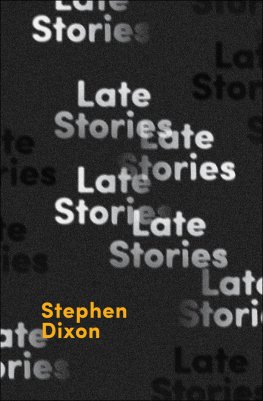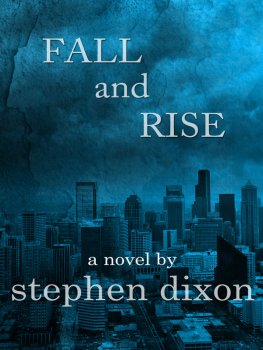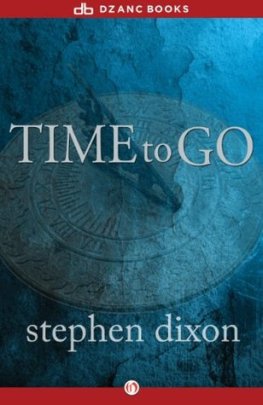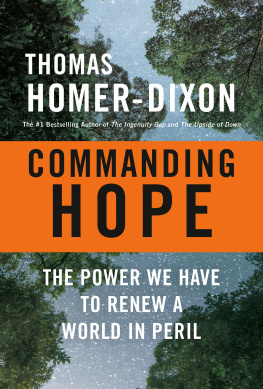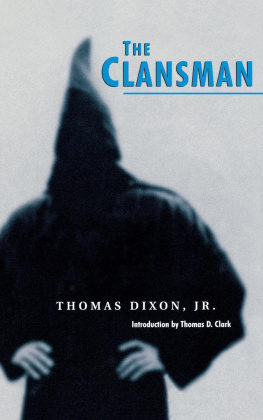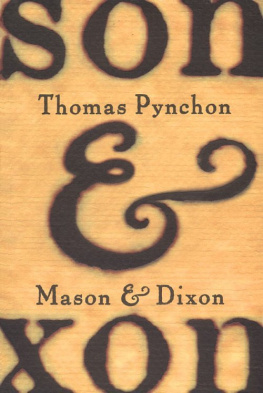AMERICAN RACIST
AMERICAN
RACIST
THE LIFE AND FILMS
OF THOMAS DIXON
ANTHONY SLIDE

Publication of this volume was made possible in part by a grant
from the National Endowment for the Humanities.
Copyright 2004 by The University Press of Kentucky
Scholarly publisher for the Commonwealth,
serving Bellarmine University, Berea College, Centre
College of Kentucky, Eastern Kentucky University,
The Filson Historical Society, Georgetown College,
Kentucky Historical Society, Kentucky State University,
Morehead State University, Murray State University,
Northern Kentucky University, Transylvania University,
University of Kentucky, University of Louisville,
and Western Kentucky University.
All rights reserved.
Editorial and Sales Offices: The University Press of Kentucky
663 South Limestone Street, Lexington, Kentucky 40508-4008
www.kentuckypress.com
08 07 06 05 04 5 4 3 2 1
Library of Congress Cataloging-in-Publication Data
Slide, Anthony.
American racist : the life and films of Thomas Dixon / Anthony Slide.
p. cm.
Filmography: p.
Includes bibliographical references (p. ) and index.
ISBN 0-8131-2328-3 (acid-free paper)
1. Dixon, Thomas, 1864-1946. 2. Motion picturesUnited StatesHistory20th century. 3. Dixon, Thomas, 1864-1946Film and video adaptations. 4. Dixon, Thomas, 1864-1946Political and social views. 5. Authors, American20th centuryBiography. 6. African Americans in motion pictures. 7. African Americans in literature. 8. Racism in motion pictures. 9. RacismUnited States. 10. Racism in literature. I. Title.
PS3507.I93Z86 2004
818'.5209dc22
2004006074
This book is printed on acid-free recycled paper meeting
the requirements of the American National Standard
for Permanence in Paper for Printed Library Materials.

Manufactured in the United States of America.

| Member of the Association of
American University Presses |
Its what we call fiction, but I think fictions
the very best history we can read.
It may not have happened just that way
But its true all the same.
Marse Rooney, the Negro schoolteacher
in Thomas Dixons The Man in Gray (1921)
quod sempter, quod ubique, quod ab omnibus
What always, What everywhere, What by all has been
held to be true
motto of the Ku Klux Klan
Get your facts first, and then you can
distort them as much as you please.
Mark Twain to Rudyard Kipling (1899)
CONTENTS
ACKNOWLEDGMENTS
I am grateful for individual help provided by Raymond Allen Cook, Robert Gitt, Evelyn Baldwin Griffith, Larry Karr, Emily Leider, Arthur Lennig, Howard Prouty, and, most of all, James Zebulon Wright, who offered open and frank comments on his distant cousin Thomas Dixon Jr. Both Arthur Lennig and James Zebulon Wright took time out of their busy schedules to read the manuscript, and I am grateful for their comments and corrections. When I mentioned to film critic Joel Siegel that I was working on a book concerning Thomas Dixon, he astonished me with the revelation that his mother-in-law, Charleen Swansea, was Dixons great-great-granddaughter and put me in touch with this remarkable woman. My thanks to you both.
Thomas Dixon left no major archival collection of papers (or films, for that matter) at any library or similar facility. However, I would like to acknowledge the institutional assistance provided by the staff of the Margaret Herrick Library of the Academy of Motion Picture Arts and Sciences; Gregory Farmer at Chapman University; the Asheville-Buncombe Library System (Zoe Rhine); Alice L. Birney, American Literature Manuscript Historian at the Library of Congress; Robert Anderson and Helene Mochedlover in the Literature Department of the Los Angeles Central Library; the Film Study Center of New York University (Ann Harris and Antonia Lant); the staff of the Doheny Memorial Library of the University of Southern California; Fred G. Turner at the Olivia Raney Local History Library of the Wake County Public Libraries system; and Megan Mulder of the Z. Smith Reynolds Library of Wake Forest University.
Dixons library of books is housed at Gardner-Webb University, and I much appreciate the help and friendship of its library director, Valerie M. Parry. The largest collection of Dixon paperssome 239 itemsis to be found in the Rare Book, Manuscript, and Special Collections Library of Duke University, where I was helped by Research Services Librarian Janie C. Morris and researcher Rod Clare.
I am deeply indebted to Gary Dartnall and Tim Lanza of the Douris Corporation, successor company to the Raymond Rohauer Collection and owner of whatever copyrights still exist in the writings of Thomas Dixon.
Finally, thanks to Angelique Cain Galskis and Leila Salisbury at the University Press of Kentucky for believing in the project.
AMERICAN RACIST
INTRODUCTION
Although some of his novels still remain in print, Thomas Dixon is relatively unknown today. His fame, or more precisely infamy, rests on his being the man behind The Birth of a Nation, responsible for the original story and concept. As such, Dixon is regarded as a major representative of Southern racism. Like the director of The Birth of a Nation, D.W. Griffith, Thomas Dixon was a proud son of the South, who learned of its history from his father. Griffith heard of the great Civil War battles from his parent, while Dixon was told by his father and his uncle, Colonel Leroy McAfee, how they had helped organize the local Ku Klux Klan in 186869. Both men told their fathers stories in The Birth of a Nation. Both were children of Reconstruction, both felt the South had been maligned, and both wanted to tell the true story as they knew it to be. The true story became almost a mantra for the two men. Griffith tried to recount what he believed to be the truth of the Civil War and Reconstruction in The Birth of a Nation, utilizing a medium with which he was familiar and which he had largely helped popularize. Dixon used the popular novel to the same end. In his mind, a Northerner, Harriet Beecher Stowe, had libeled the South in Uncle Toms Cabin. Thomas Dixon set out to put the record straight with The Leopards Spots (1902), The Clansman (1905), and other novels.
As one of the greatest of nonfictional Southern writers, W.J. Cash, has pointed out, the Civil War may have temporarily destroyed the South, but it left intact the Southern mind and will. The tragedy and sorrow of the Reconstruction period fortified and confirmed that mind-set, and from it, in natural succession, developed the fertile and creative works of Thomas Dixon and D.W. Griffith.
Raymond Allen Cook wrote the only published biography of Thomas Dixon, Fire from the Flint. Its subtitle, The Amazing Careers of Thomas Dixon, properly acknowledges that the subject was not only a prolific and controversial novelist but also a popular lecturer on the Chautauqua circuit, a lawyer, a minister, a playwright, and above all, a spokesman for his generation of Southerners. Back in 1959, Cook wrote effusively on Dixon, arguing that his personality is one of the most compelling in American history. Rarely does a man achieve great success in more than one field. More rarely still does a man achieve fame in three or more fields.
Next page

